
An asteroid?? Well, yes. It seems that the rules which decide what’s a planet and what’s a pluton and what’s just space trash are rather fluid. Like the rather changeable definitions of psychiatric diagnoses, the designation “planet” has some political undertones. Thus, the IAU, at its conference in Prague, will decide on August 24th whether or not these upstarts will be added to the list of planets, forcing billions of school children to devise new mnemonics for remembering a newly enlarged planetary system. Bummer.
To get the details on the fluid definition of what makes up a planet, and to keep up on the outcome of the vote, be sure to read Bad Astronomy Blog.

Hat tip: Josh Reviews Everything via “The Carnival of the Capitalists” at The Business of America is Business blog. If you haven’t been following the carnival, you might want to look in. I'll bet you can't hit just one link. For instance, there’s an intriguing entry entitled “How a Bad Boss Improves Your Career” and another on France’s reliance on hand-writing samples in choosing employees, and yet another on why you don't need money to start a business.
The Capitalists’ Carnival has the most intriguing entries of any blog grouping I’ve seen. But then that’s the entrepreneurial — and social — nature of business.

5 comments:
Okay, I'm reactionary enough not to like any of this...There's 9 planets, and that's all there is to it.
To make matters worse, they wanna come up with new planets, and they don't even name one of them ? Some dopey number.
If they HAD to number a planet...why not call it "LV-426..."
Yeah, traditional astrolgy only included the 5 "naked eye" planets, plus the moon and sun. Since there are twelve constellations, many of the planets had to do double duty.
"Modern" astrologers have retrofitted their ancient art to include the 3 new telescopic planets, up to Pluto (still not quite covering the whole set of constellations).
Now maybe they can claim they finally have a planet for each "house" (at least until the number starts going up again). Should be good for business.
Scott:
To remove Pluto as a planet would
be a victory for the proponents of
nihilistic deconstructionism.
No, I wouldn't say that at all. I, like everyone else here, grew up learning that there were nine planets in our solar system. However, as an unsentimental, hard-nosed realist, I have maintained for several years that either Pluto should be "demoted" and considered the largest comet, or else Ceres should be "promoted" to a planet instead of being considered the largest asteroid.
Ceres was discovered in 1801, and for a brief moment was thought to be a tiny planet orbiting between Mars and Jupiter. But by 1807, three additional objects were found orbiting in the same region, which complicated matters. So a new category, "asteroid" was created to describe them. More and more of them were discovered as the years passed.
I have a high school astronomy textbook from around 1880 which lists and names about 150 known asteroids. (I won't even go into the mathematics used in that textbook, which would no doubt ruin the self-esteem of modern high school students.)
All those early asteroids were discovered visually, by looking through a telescope, without the benefit of photography. Astrophotography didn't really come into its own until the 20th century.
In 1930 Clyde Tombaugh discovered Pluto after several years of arduous work comparing photographs of the same area of sky taken on different nights, and looking for the "star" that moved. He was deliberately searching for a planet because calculations of the motions of Uranus and Neptune suggested that there must be another planet further out that was gravitationally affecting them. Although Pluto was hailed as the "ninth planet", it quickly became apparent that it was too small to account for the gravitational effects. (No large planet has yet been found, so it's possible that the positional measurements of Uranus and Neptune were in error.)
For more than 50 years Pluto was the only object known in the region beyond Neptune. But around 1990 another was found, then another, and then the floodgates opened. I don't know what the current count is, but it's at least in the hundreds, if not thousands. This collection of objects is now known as the "Kuiper bBelt" for the 1950's astronomer who predicted its existence. It could also be called the "comet belt".
So in my opinion Pluto bears the same relation to the Kuiper belt as Ceres does to the asteroid belt. Both are simply the largest members of their class of objects.
Then along came 2003 UB313, which may be larger then Pluto and further complicates matters. I have read that some astronomers think that even larger Kuiper belt objects may yet be discovered, perhaps as large as Mars.
Therefore I think it's best that we think of the solar system as consisting of eight planets plus a myriad of asteroids and comets. Otherwise we get into arbitrary definitions of planets based on size. Really, everything orbiting the sun could be called a "planet", just as the billions of particles comprising Saturn's rings could be called "moons".
But no matter what we call Pluto, the mere nomenclature doesn't detract from discoverer Clyde Tombaugh's work in the least. It was still a tremendous feat of observation and perseverance. And I am equally in awe of the 19th century asteroid discoverers, who did their work without the benefit of photography.
Pluto is in the news again. They have un-planeted Pluto !
Hope you're as upset as I am...
http://dhchaos.blogspot.com/2006/08/eggheads-without-keepers.html
Another way to look at it is that Clyde Tombaugh didn't discover the ninth planet; he discovered the first Kuiper Belt object, and was more than 50 years ahead of anyone else!
Post a Comment